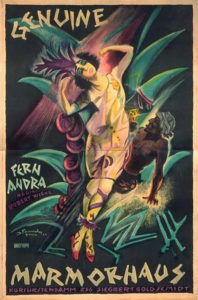 This is Robert Wiene’s little-known 1920 follow-up to THE CABINET OF DR. CALIGARI, GENUINE features many of the same themes of that seminal classic, registering as a strikingly dreamlike blend of visual artistry and ahead-of-its-time eroticism.
This is Robert Wiene’s little-known 1920 follow-up to THE CABINET OF DR. CALIGARI, GENUINE features many of the same themes of that seminal classic, registering as a strikingly dreamlike blend of visual artistry and ahead-of-its-time eroticism.
For whatever reason GENUINE (GENUINE, DIE TRAGODIE EINES SELTSAMEN HAUSES/GENUINE, THE TRAGEDY OF A STRANGE HOUSE) is known to most of the world in a condensation misleadingly titled GENUINE, THE TALE OF A VAMPIRE (currently available as an extra on the Kino CABINET OF DR. CALIGARI DVD). This version runs 44 minutes, precisely half the length of the 88 minute original version.
Among the things missing from the 44 minute version of GENUINE:
- The opening scene, in which a man seeks to purchase the protagonist Percy’s painting and is refused.
- The details of Percy’s arrival at the mansion where most of the film takes place.
- A sequence in which Percy’s rival Florian suffers a nightmare depicted via images that appear in the air around his bed.
- The title character’s climactic redemption through love.
- The eventual it’s-all-a-dream reveal (whose absence is downright inexplicable).
The renowned painter Percy appears to be going mad, a condition apparently caused by his horrific artwork. Then one day a man enters Percy’s house to purchase one of his paintings, a portrait of a mysterious woman known as “Genuine.” Percy, however, refuses to sell it. After the man leaves Percy falls asleep near the painting in question, whose subject unexpectedly comes to life.
Genuine, we learn, was the hypnotically gifted priestess of an ancient tribe. She’s sold as a slave to Lord Melo, an elderly scientist who resides in a mansion filled with mirrors, skeletons and bizarre architecture. There Genuine is shut up in a secluded underground greenhouse containing otherworldly vegetation, while Melo has his face shaved by the creepy barber Guyard.
Around this point we learn that Percy is Melo’s grandson, and is about to pay his elder relative a not-entirely-welcome visit. Also visiting the mansion is Guyard’s nephew Florian, who seeks to become his uncle’s apprentice.
Genuine escapes from the Greenhouse and hypnotically induces Florian to slash Melo’s throat. Florian and Genuine then commence a perverse affair in an upper room of the house, with Genuine exuding a decidedly creepy sensuality.
Percy arrives at the mansion, and finds himself immediately smitten with Genuine. She return his affections, leaving Florian devastated. Percy’s love is strong enough, in fact, that it purifies Genuine’s evil nature. This doesn’t stop outraged townspeople from swarming the mansion, just as Florian goes mad and kills Genuine.
From there we flash back to Percy asleep in his house. The preceding has apparently been a nightmare, albeit an extremely vivid one that inspires Percy to attempt to deface his painting of Genuine—and then finally sell it.
GENUINE lacks the simplicity and visual audacity of THE CABINET OF DR. CALIGARI, and its narrative, encompassing weird science and fairy tale exoticism, is quite murky. The visual style of wide shots broken by occasional close-ups is certainly redolent of the time the film was made, but doesn’t do the hallucinatory narrative justice. The intertitles also leave much to be desired, consisting as they do of bulky paragraphs and lengthy dialogue exchanges (in this respect the 44 minute condensation, with its more succinct intertitles, actually improves on the original version).
Yet Wiene’s expressionistic visual sense is in full evidence, presenting itself (as in CALIGARI) through wildly distorted and outlandish set design, which succeeds in rendering Genuine’s hypnotic eroticism in visual form. In the title role Fern Andra, who appears in a variety of outrageous outfits that to modern eyes look like S&M garb, prefigures Brigitte Helm in METROPOLIS and ALRAUNE, and also Elsa Lanchester in THE BRIDE OF FRANKENSTEIN, although Andra’s rather hysterical and overdone performance isn’t in the same league.
As for the it’s-all-a-dream ending (which compliments the finale of CALIGARI, wherein everything turned out to be a schizophrenic hallucination), keep in mind that the device wasn’t nearly as hackneyed in 1920 as it seems today.
Vital Statistics
GENUINE (GENUINE, DIE TRAGODIE EINES SELTSAMEN HAUSES)
Decla-Bioscop AG
Director: Robert Wiene
Producer: Erich Pommer
Screenplay: Carl Mayer
Cinematography: Willy HameisterCast: Fern Andra, Albert Bennefeld, Lewis Brody, John Gottowt, Ernst Gronau, Harald Paulsen, Hans Henirich von Twardowski
